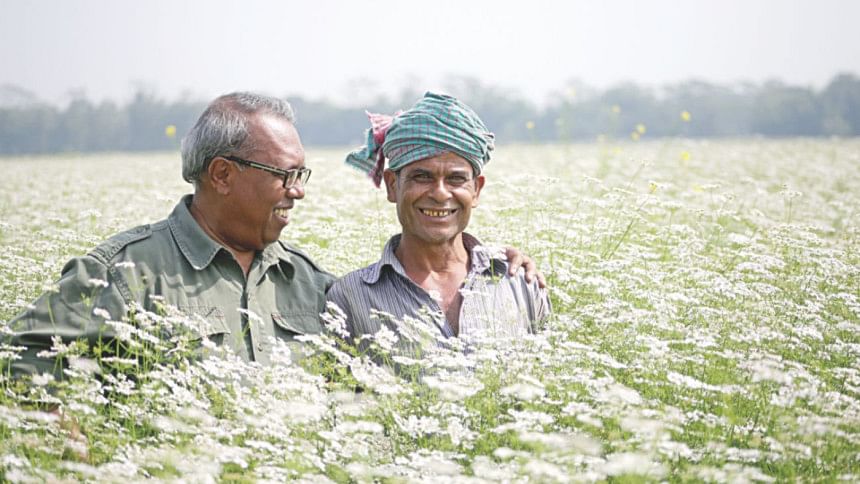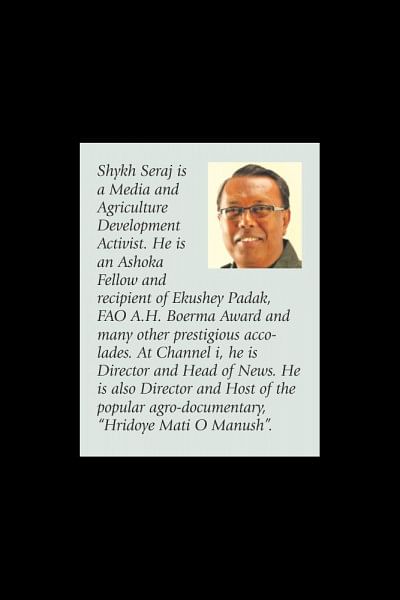Spice crops spice up the rural economy

Besides onion and garlic, fields are full of coriander seed and cumin seed across Bangladesh. Specially, Shariatpur's Jajira has become the hub of spice crops for the country. According to the Department of Agricultural Extension (DAE), this year cumin seed is cultivated on 3,750 hectares of land in Shariatpur alone. In Jajira upazila it was cultivated on 880 hectares of land. In addition, coriander seed was cultivated on 5,570 hectares of land in the district, 2200 hectares in Jajira alone.
The lands full of white coriander flowers bring out a remarkable landscape in Jajira. This is a traditional crop of the region. Along with it beekeeping has turned out to be a new prospect for the bee-farmers as well in the area. I have seen lots of bee-boxes all around the Jajira upazila. I can clearly remember, I came here six to seven years back when the farmers were getting honey only from mustard plant. Now, the scene has completely changed.
And, the farmers are really happy with the money they are getting from it. This year the market is in favour of the farmers. Throughout the year, they have got good price for onions and coriander seed has given them an extra boost. I talked with farmer Abdul Jabbar who cultivated coriander seed on one bigha (33 decimal) of land.
"How much do you spend for coriander seed on this land?" I asked Abdul Jabbar.
"Tk 6,000 (around USD 70)," he replied.
"I get six maunds of coriander seed," he added.
"And, what about price per maund?" I asked again.
"Tk 4,000 (around USD 48) on an average," he gladly replied.
"So you're getting Tk 24,000 while spending only 6,000," I said.
"By the grace of Almighty. I'm also giving lease money of Tk 3,000," he replied.
It means, Jabbar is earning Tk 15,000 (around USD 177) profit from coriander seed cultivation on his one bigha of land, which is very impressive, I would say. Jabbar also said he earned a very healthy profit from onion as well.
I went to another area of Jajira, Purbo Kajikandi, where coriander seed and mustard are grown as cash crops. Farmer Mahtab Uddin says he cultivated coriander and mustard together and it has worked really well for him this season. Farmers are also getting some profit from the beekeepers.
"I am getting 16 maunds (40 kg) of coriander from two-bigha land," says Mahtab.
"Then, I will cultivate jute and then rice which I will harvest during the month of Kartik," added Mahtab.
Although some farmers believe in a myth that the bees curb the produce of their crops I have convinced them that because of the pollination, the production will rise and bee is a friendly agent in this process.
Sub-Assistant Agriculture Officer Taiyab Ali Molla agrees.
"Many farmers are learning about the pollination and they now know how the bees are helping their spice crops," he says.
Palash has returned from abroad and joined farming. Farmer Palash is totally supporting the beekeeping on his coriander field. He's now cultivating coriander on one and a half bighas of land. He certainly has got good profit from his coriander field.
"Farmers are now more aware of science and technology as they are eager to learn. That's highly positive for farming sector and especially for spice crops," says Palash.
"Within a short time, all the farmers will get to know about pollination," adds Palash.
Honey collectors known as moual are also staying beside the fields under tents. One of them, Abdul Majid was busy with his bee-boxes. I talked with him about the prospect of beekeeping. In different flower seasons these people arrive with their boxes. They keep on collecting honey from mustard, coriander, litchi flowers and also go deep inside the mangrove forest, Sundarbans to get the natural honey.
"Farmers now invite us to their fields to collect honey as they now know about the magic of pollination," says Majid.
It is evident that beekeeping has highly influenced an increased production in mustard and coriander as well as several other crops. Now, the farmers and the beekeepers believe that biodiversity is the heart of farming.

Let's draw your attention to another issue. Farmers are very much aware of their market, how much profit they are going to earn at the end of the day. They are keen and very optimistic about getting the fair price for their produce. They not only focus on production, but they also know what their production is going to give them in return. Their demand is for a favourable market infrastructure. Some farmers say although hundreds of maunds of coriander is being traded at Kazirhat, Jajira, but the profit margin is not up to the farmers' expectation.
Wholesaler Rafique says the lowest price per maund is Tk 2,400 and the highest is Tk 4,000.
Some farmers complain that they get good price for some of their produce but on an average, they fall behind their expected profit. Going to Kazirhat, I found that cumin seed price is slightly better than coriander but the production of cumin highly depends on the soil quality. I saw another interesting incident. The farmers who have become wholesalers are making a sort of double profit for their double role. But, the role of the wholesaler gives them more money. This demands a further and in-depth research on how the role players are influencing the prices in village market.
Farmers do need an orderly market system. They get fair price one day and the scene turns unfavourable on the other day. The market has its own language and farmers sometimes fail to understand it and often they feel the mechanism is obfuscating for them. They want an easy platform to sell their diversified produce. The market definitely has changed over the years and farmers are getting much better price today. But, they want a fair pricing system so that their spice crops along with others are sold at reasonable rates.
At the end of the day, farmers love their crops and of course the soil. They love the country more than anything else. That's how I truly believe, like everyone. And, it is our duty to ensure that the people, who are feeding us every day, must be given a proper market infrastructure facility so that they are comforted and inspired to produce more.
Advanced greeting on another new Bangla year. Happy Pahela Baishakh, 1425.

 For all latest news, follow The Daily Star's Google News channel.
For all latest news, follow The Daily Star's Google News channel. 



Comments